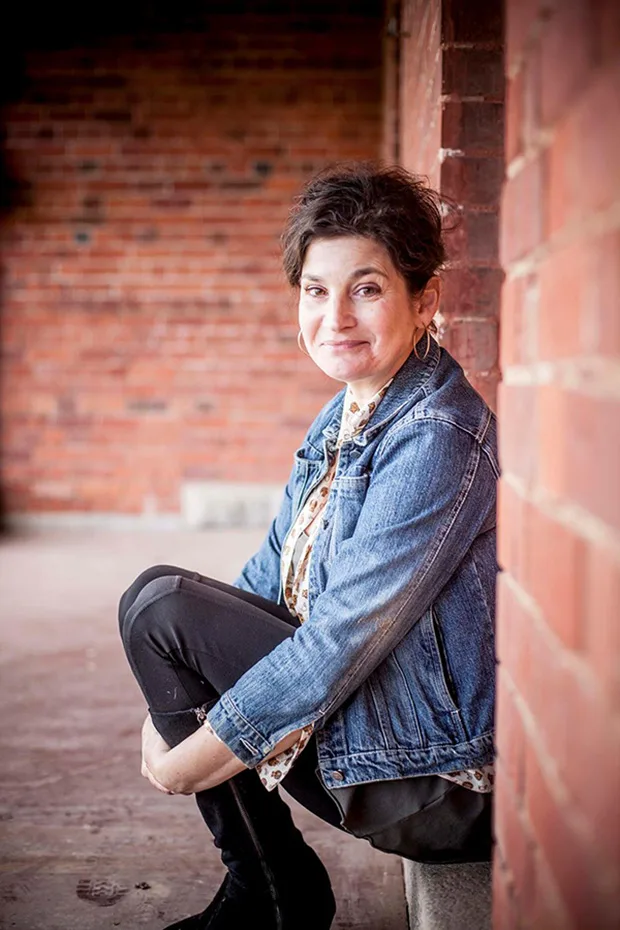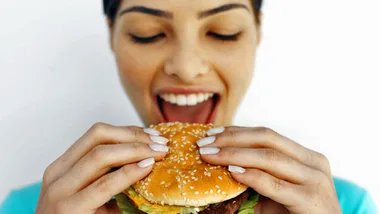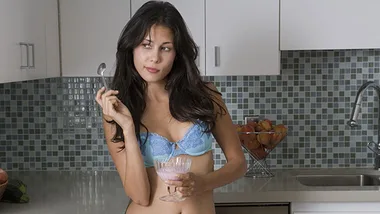I’ve just eaten a litre of vanilla ice cream, a packet of chocolate biscuits, a frozen cheesecake and seven dried figs in less than forty minutes.
But what’s triggered this lack of control, this most recent escape into such short-lived anaesthesia?
Well, my laptop suddenly gobbled up the two thousand words I’d just written for this article and emotional eating has been a big part of my life for the past 35 years.
Given this article’s subject matter, though, I’m more amused than ashamed; an emotion that usually engulfs me halfway though and directly following a binge, and that most likely sent me fleeing to food in the first place.
There is something particularly abject about chomping down into a frozen Sarah Lee past its use-by date.
BED (Binge Eating Disorder), the most common of eating disorders in Australia and more prevalent than anorexia nervosa and bulimia nervosa, affects almost as many men as it does women of all shapes and sizes, incomes and ethnicities, and its occurrence in the over-40s-demographic has doubled in the past decade.
Most people still assume this kind of crazy eating is for teenage girls or celebrities, whose every visible rib, baby bump and puckered thigh are exploited for all they’re worth and for all of us ordinary peeps to perve at.
However, I’m not a celebrity or a mid-lifer in denial of the ageing process and seeking love and acceptance from a vanilla slice. I’m an educated, middle-aged, middle-class feminist.
So why can’t I stop eating compulsively and start relating to food like a “normal” person?
In her book Midlife Eating Disorder, Cynthia M. Bulik, PhD, points out how, recently, BED in older people has been acknowledged as a serious illness and that, “in the medical field, typecasting eating disorders as teen disorders poses dangerous challenges for adult women and men seeking care”.
My love-hate-but-mostly-hate relationship with food started when I was a teenager.
My girlfriends and I would loll about at school talking diets, food, fat and calories, and how great it would be if only we were perfect. None of us was overweight, but that’s not the point. I was already hiding food from Mum, shoplifting Tim Tams and not eating in front of boys.
When I left home at 18 to go to university, I lived in a share-house and survived on take-away kebabs and the jam doughnuts one of my housemates routinely brought home from working at his dad’s doughnut van.
I’d binge and starve, eat and fast, diet and exercise, and in between it all, and if I had the time and energy, go to university and waitress at a local cafe.
It was around this time and after a 10-day fast of cappuccinos and menthol cigarettes that I attended my first therapy session, and the physiologist gave me a little book called Fat Is A Feminist Issue by Susie Orbach.
Susie’s take on the female body and self-esteem issues from a feminist perspective was a revelation and that she suggested giving up dieting and eating what I liked and when I wanted was welcome relief. For a time.
I binge when in extremes – extremely bored, sad, pathetic, in love, self-hating, procrastinating, anxious, frightened, rejected, drunk, happy, sexually frustrated.
I binge when my 12-year-old son is asleep. I eat in bed while I’m reading. I consume calories like the Cookie Monster when I’m watching television and I can devour the pantry while on the phone, as long as the other person does most of the talking.
I fret I am not a good role model for my son, that I am projecting onto him my own disordered thinking and that he has inherited the same binge-eating schema.
Sometimes, I’m grateful I don’t have a live-in partner because my BED is plain embarrassing and I’m too old and self-aware to be so out of control and focussed on food when there’s still so much else to do, like trying to keep kids out of barbed wire enclosures for one thing.

Elly Varrenti.
Maybe it’s because of my disorder that I don’t live with a significant other. Or maybe I don’t want one and I keep a hold of my “issues” as a form of self-sabotage.
“Partners and children suffer when adult women and men are afflicted,” writes Dr Bulik.
“The cost of treatment renders families destitute and destroys relationships. Intimacy is crushed by body image concerns. Trust in relationships is shattered as women and men desperately try to hide their illness from others.”
I dissemble around my relationship with food. I cancel social occasions and work commitments. I hide at home. I make pretend excuses as to why I’m not eating at a dinner party because on the way there I’d actually stopped off at a 7-Eleven and gobbled up enough junk food for an end-of-season footy bash.
It’s hard navigating intimate relationships at any time, let alone when an eating disorder can dictate how you feel and think about your body. And by extension, how you feel about someone else touching it, looking at it and planning on enjoying it.
I love to cook for friends and family, but how can I do this when I’m “in the food” as the OA (Overeaters Anonymous) 12-Steppers would say.
“In the food” means being in the zone that is the binger’s private’s hell.
In 2012, BED was added to the DSM-5 (The Diagnostic and Statistical Manual of Mental Disorders) and now has its own set of criteria as distinct from the other more widely known eating disorders.
According to the DSM-5, a diagnosis of Binge Eating Disorder (BED) is characterised by “recurring episodes of eating significantly more food in a short period of time than most people would eat under similar circumstances, with episodes marked by feelings of lack of control.”
Some days, I wake up with a major food hangover and the nausea, fatigue, anxiety, fuzzy thinking, Irritable Bowl Syndrome and depression are debilitating.
Living with an eating disorder when you’re a grown-up with kids, a mortgage, an 82-year-old mother who knows you inside out and a job is both harder to hide because of all the responsibility, but often easier to get away with, too.
If I want to drive to the shop, come home and consume a $50 fix in my bedroom, I can. I do.
BED can be an expensive habit.
My BED has waxed and waned over the years. For weeks and months, I’d be fine, in control, my illness manageable, and then – wham! – one emotional trigger and I’m off again and gorging.
When my sister died four years ago, my BED was triggered big time and I also took up running. A lot. In fact, I couldn’t stop moving. I began training for a half-marathon.
My grief had turned my life onto high flame and I was in psychic-free-fall, and as I fell, I began to drink and to take Valium to help me sleep. Within six months, I had become a bingeing, alcoholic, grief-stricken, drug-addicted, promiscuous marathon runner.
These days, I still run, but far less obsessively, drink only occasionally because the alcohol can trigger a binge and listen to book readings on a podcast instead of downing Valium to get me to sleep at night.
Food is the “good girl’s drug” as Sunny Sea Gold describes in her book How To Stop Using Food To Control Your Feelings.
I’ve used benzodiazepines, alcohol and tobacco occasionally, but food remains my drug of choice.
The grief is still there, that will never go away. When I have sex, I make it as free of mind-altering substances as possible. It’s sexier that way.
Obesity and eating disorders are a capitalistic dream, but we are forever blaming the individual instead of the food and those who are financially invested in our consuming it.
“Because who should be shamed are the food companies that are producing foodstuffs that aren’t even food,” writes Susie Orbach.
“Who should be shamed are the corporate structures not the individuals.”
When the man with whom I was having a relationship decided – around the same time I was retrenched from my long-term tertiary teaching position early last year – that it was easier to pay me to go away for a week to a health retreat than to commit to me, I was thrown into a bubble of boundary controls and extreme sports.
I stopped bingeing and gave myself over wholeheartedly to the control of a suite of clean-living life-coaches and organic chefs, naturopaths and flower readers.
I felt great after that week at detox boot camp, but it’s impossible to maintain that kind of regimen in one’s own environment. After three weeks at home, with my relationship in disarray and my finances, too, I began to retreat back into food and the whole cycle began again.
BED does not just screw with your brain – it can stuff up your body also.
“Some, but not all, of the complications associated with BED are secondary to obesity, such as Type 2 diabetes, gallstone, high blood pressure, stroke, digestive problems and high cholesterol,” says Dr Bulik.
Going through menopause has also contributed to my renewed “enthusiasm” for bingeing. While my hormones rage and I do, too, I use food as company when I’m not up to any other kind. Yet it’s the regular exercise and healthy eating, in between the less frequent binges these days, as well as the therapy, that has all kept me from going completely nuts.
And being honest.
Writing and talking about my condition has been a way to cope, although my mother is appalled I would go public yet again with another of my lamentations.
I used to hide food from Mum and my illness from everyone else, but no more. As the analyst D.W. Winnicott said, “It is a joy to be hidden, but disaster not to be found.”
Elly Varrenti is a writer, columnist and broadcaster. For more of her work, visit her website, here.



